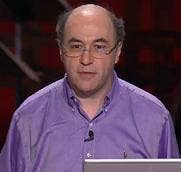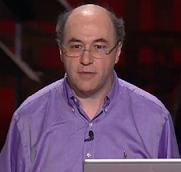Stephen Wolfram is Computing a Theory of Everything (video)

Share
What if the universe, in all its physical complexity, could be explained by just a few simple computational rules? Stephen Wolfram wants to find out not only if that is true, but what it would mean if it was. In his talk at TED this year, Wolfram gave an overview of this effort to compute a "theory of everything" - an explanation of how our universe works. Such an ambitious plan may seem ludicrous if it came from almost anyone else, but Wolfram is the driving force behind Mathematica and Wolfram Alpha. His computational approach to problems has led him to even develop a new science. Check out his presentation in the video below. He may be on to something big.
Wolfram frames his computational goals in terms of understanding "the universe", but if he's successful we would see many more applications right here on Earth. There are many complex systems in the world that seem to defy easy understanding: the weather, geopolitics, and the global economy to name a few. These systems, when viewed through traditional scientific and mathematical means, are usually considered too chaotic to simulate in full. Wolfram is essentially proffering a new approach to these problems - look for simple computational rules that generate the chaotic systems (something akin to fractals).
What do we mean by rules? Skip through the beginning of his talk to 1:51 to hear him introduce how rules can form a simple computational program. He continues on from there to explain some basic tenets of his new science such as simple systems are capable of complex computations. If you've already read our discussion about Wolfram Alpha and its iPhone App, you can skip from 5:45 to 8:45. From there on out, though, I would really listen to everything. Stephen talks about Wolfram Alpha's ability to process questions in ordinary language (8:45). He claims the program has an 80% success rate for answering queries on the first try - that's pretty incredible. He also continues to explain how Mathematica and Wolfram Alpha together can democratize programming (11:30), and help us explore the computational materials of his new science (12:50). His thoughts on how we could model the physical universe with his computational approach (starting at 14:08) are really intriguing.
Be Part of the Future
Sign up to receive top stories about groundbreaking technologies and visionary thinkers from SingularityHub.


A transcript for the video, along with slides, can be found on Stephen Wolfram's website. I really recommend you check it out as some of the implications of his work are a little hard to understand on the first time through. Translations of the talk are available through TED for those who have a hard time following this in English.
I've listened to this video a few times and I'm still a little at a loss as to where Wolfram's approach to understanding the universe will ultimately lead. Certainly he could help reduce chaotic systems into a few clear rules. Those rules may or may not lead to being able to make accurate predictions about our physical world, but they'll certainly give us a new way of understanding it. Wolfram could also help us generate insanely complex programs out of much simpler ones by building computational rules and seeing how they play out. There's implications there for artificial intelligence and brain modeling.
For now, I'm rather happy with the by products of Wolfram's pursuit of a computational theory of everything. Wolfram Alpha, though often esoteric, is a powerful tool. Other programs, like the highly addictive Wolfram Tones, are fun to play with and are very useful in their particular fields. As Stephen Wolfram continues to explore computation, many more such applications may arise. I'm certainly interested to see how Wolfram Alpha's democratized approach to programming (through use of ordinary language) generates new innovations. Who knows, maybe someone will find a way to program robots to love.
[screen capture and video credit: TED]
[source: Stephen Wolfram]
Related Articles

Scientists Send Secure Quantum Keys Over 62 Miles of Fiber—Without Trusted Devices

This Light-Powered AI Chip Is 100x Faster Than a Top Nvidia GPU

How Scientists Are Growing Computers From Human Brain Cells—and Why They Want to Keep Doing It
What we’re reading
